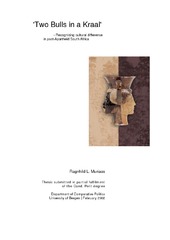| dc.description.abstract | This thesis addresses the dilemmas that might occur when one introduces liberal strategies for accommodating difference in a society with deep cultural cleavages. In the last few decades there have been an exhaustive debate in the western democracies on multiculturalism. The questions addressed are whether liberal democracy not only should recognise people because they are, but also for who they are. Four normative theoretical thinkers are presented, who all seek to provide strategies for how it is possible to make the right to cultural protection compatible with the right to equality.The empirical analysis is an in depth study research of the South African process of accommodating difference. How and why did African traditional authorities become recognised in the new South African constitution of 1996, and to what extent was this recognition followed by the political action aimed at both reforming these institutions and clarifying their position in the democratic future?There were three dilemmas from a liberal point of view, connected with the recognition of traditional authorities.1) Traditional authorities were not compatible with the right to equality. 2) Recognition of traditional customs and practices might force an identity upon members of rural traditional communities. 3) Traditional authorities were not compatible with democratic structures and principles. There were however three aspects that influenced the traditional leaders position in the negotiations prior to the signing of the constitution. These were the centre-periphery aspect, the ethical aspect and the strategic aspect.The conditioned recognition seemed difficult to implement, and the government promised to address the questions through official statements and initiated legislations, but few bills have been enacted. The prerequisites founded by the liberal perspectives applied were not present to a sufficient degree. The consequence of this inability to deliver on promises has caused the problem of ‘Two Bulls in a Kraal’, which implies that in rural traditional communities double structures of both political and judicial authorities are functioning without any clear rules for how both democracy and traditional institutions are to coexist. | en_US |
